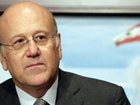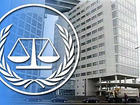Ministers loyal to Free Patriotic Movement leader Michel Aoun have accused Progressive Socialist Party chief Walid Jumblat’s representatives in the cabinet of turning the electricity crisis into a political struggle.
“Ninety percent of the plan has been discussed and only the political problem stirred by MP Walid Jumblat remains under discussion,” FPM sources said in remarks published in several Beirut dailies.
 Full Story
Full Story
President Michel Suleiman has warned cabinet ministers against division on a controversial electricity bill, saying the government shouldn’t collapse over “technical” differences between ministers loyal to Free Patriotic Movement leader Michel Aoun and Progressive Socialist Party leader Walid Jumblat.
Suleiman’s sources told As Safir daily published Thursday that the president’s warning came during a 10-minute cabinet session held at the Baabda palace.
 Full Story
Full Story
Premier Najib Miqati’s cabinet was in tatters on Thursday after differences between Free Patriotic Movement leader Michel Aoun and Progressive Socialist Party leader Walid Jumblat on a controversial electricity bill spiraled out of control.
There was little hope that the cabinet would endorse the electricity plan on Sept. 7. On Wednesday, the government again failed to reach an agreement on the bill.
 Full Story
Full Story
March 14-led opposition lawyers are expected to hold a press conference next week to snap back at Loyalty to the Resistance bloc MP Mohammed Raad, An Nahar daily reported Thursday.
On Tuesday, Raad accused Israel and the U.S. of drafting the indictment published by the Special Tribunal for Lebanon. It accuses four Hizbullah members in ex-Premier Rafik Hariri’s Feb. 2005 assassination case.
 Full Story
Full Story
Progressive Socialist Party leader MP Walid Jumblat held talks Wednesday at his Clemenceau residence with a delegation from Libya’s rebel National Transitional Council, in the presence of ministers Ghazi Aridi and Wael Abu Faour and the PSP’s deputy chief for foreign affairs Dureid Yaghi.
Delegation member Abdullah al-Zaidani handed Jumblat an invitation to visit Libya and a letter of gratitude from National Transitional Council chief Mustafa Abdul Jalil.
 Full Story
Full Story
Disputes erupted at cabinet on Wednesday between ministers from the Free Patriotic Movement and the Progressive Socialist Party over the electricity draft law that was proposed by FPM leader MP Michel Aoun.
Ministerial sources told the Central News Agency that the electricity file was set as a priority, but talks soon took a sour turn as the FPM and PSP ministers accused the other of adopting a militia mentality and seeking to impose their will by force.
 Full Story
Full Story
Prime Minister Najib Miqati denied on Wednesday that the cabinet is under threat saying there is full solidarity among ministers despite a postponement of a session on the electricity crisis to September 7.
Following talks with Speaker Nabih Berri at the parliament, Miqati said the atmosphere of the government session held at Baabda palace was good.
 Full Story
Full Story
Parliament session was postponed on Wednesday because of the lack of quorum and the cabinet’s failure to attend it.
Only 52 MPs made it to the session and minister Nicolas Fattoush served as the only government representative.
 Full Story
Full Story
General Prosecutor Saeed Mirza will submit to the Special Tribunal for Lebanon the relevant files of the attacks against former ministers Marwan Hamadeh and Elias al-Murr and the assassination of ex-Lebanese Communist Party leader Georges Hawi.
Pre-Trial Judge Daniel Fransen as ruled that the three attacks are linked to the 2005 murder of former Prime Minister Rafik Hariri.
 Full Story
Full Story
Energy Minister Jebran Bassil has stressed that cabinet ministers have no longer excuses to reject a $1.2 billion electricity plan after he provided answers to the contentious clauses of the project.
“Everything has become clear,” Bassil said in remarks to As Safir daily published Wednesday.
 Full Story
Full Story



